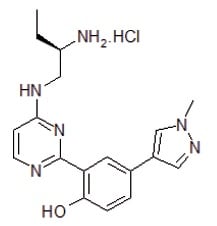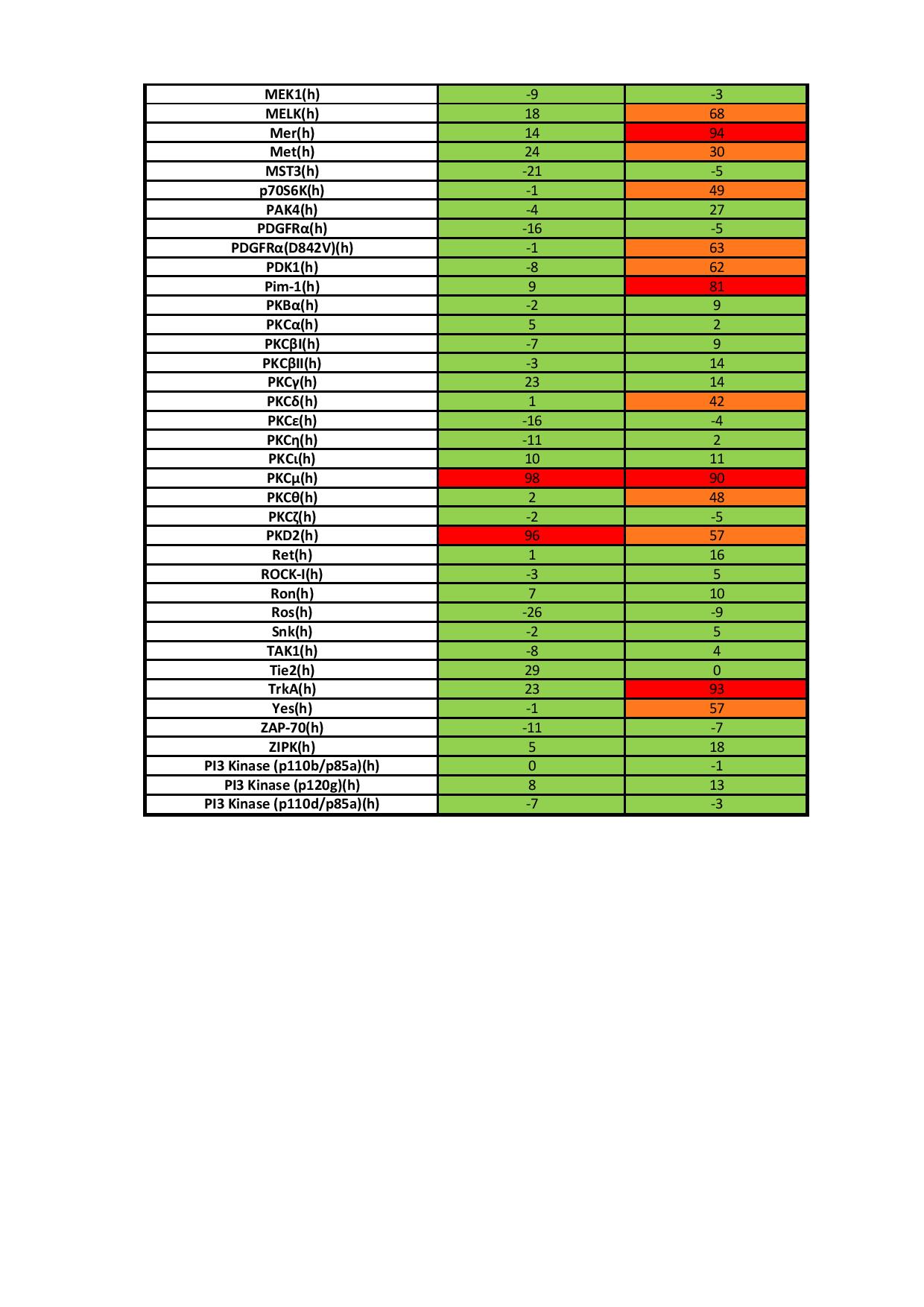Protein Kinase D inhibitor CRT0066101 Small Molecule (Tool Compound)
Invented by Dr Mark Charles from Cancer Research Horizons
Invented at Cancer Research Horizons
- Datasheet
- References (14)
- Inventor Info
Info
| Catalogue Number | 151831 |
| Antigen/Gene or Protein Targets | Protein Kinase D (PKD) |
| Type | Inhibitor |
| Relevance | The Protein Kinase D inhibitor CRT0066101 is a potent antitumoral agent in vitro and in vivo. Protein kinase D (PKD) is an evolutionarily conserved protein kinase family with structural, enzymological, and regulatory properties different from the PKC family members. Signaling through PKD is induced by a remarkable number of stimuli, including G-protein-coupled receptor agonists and polypeptide growth factors. PKD1, the most studied member of the family, is increasingly implicated in the regulation of a complex array of fundamental biological processes, including signal transduction, cell proliferation and differentiation, membrane trafficking, secretion, immune regulation, cardiac hypertrophy and contraction, angiogenesis, and cancer. PKD mediates such a diverse array of normal and abnormal biological functions via dynamic changes in its spatial and temporal localization, combined with its distinct substrate specificity. Studies on PKD thus far indicate a striking diversity of both its signal generation and distribution and its potential for complex regulatory interactions with multiple downstream pathways, often regulating the subcellular localization of its targets. |
| On Target IC50 | IC50 1, 2 and 2.5 nM for PKD1, PKD3 and PKD2 respectively |
| Selectivity | Selectivity for PKD against a panel of >90 protein kinases, including PKCα, MEK, ERK, c-Raf and c-Src. |
| Molecular Formula | C18H23CIN6 |
| lUPAC | 2-[4-((R)-2-Amino-butylamino)-pyrimidin-2-yl]-4-(1-methyl-1Hpyrazol-4-yl)-phenol; hydrochloride |
| Molecular Weight (g/mol) | 374.86776 |
| In vivo applications |
In Panc-1 subcutaneous xenograft model, orally administration of CRT0066101 at the dosage of 80 mg/kg/d for 24 days significantly suppressed pancreatic cancer growth. Moreover, when CRT0066101 reached its peak concentration (12 μmol/L) in tumor model, the expression of activated PKD1/2 in the treated tumor explants was substantially decreased. It was concluded that CRT0066101 given orally at 80 mg/kg/d for 21 days in Panc-1 orthotropic model suppressed tumor growth potently in vivo. Clinical trial: So far, no clinical trial has been conducted. |
| In vitro applications | In Panc-1 cell line based assays, CRT0066101 was reported to reduce bromodeoxyuridine incorporation; increase cell apoptosis; suppress neurotensin-induced PKD1/2 activation; block neurotensin-induced Hsp27 phosphorylation; interrupt PKD1-mediated NF-κB activation as well as down-regulate expression of NF-κB-dependent proliferative and pro-survival proteins. |
| Research Area | Cell Signaling & Signal Transduction |
| Notes |
Using Panc-1 as a model system, it has been demonstrated that CRT0066101: • Reduced bromodeoxyuridine incorporation • Increased apoptosis • Blocked neurotensin-induced PKD1/2 activation • Reduced neurotensin-induced, PKD-mediated Hsp27 phosphorylation • Attenuated PKD1-mediated NF-κB activation • Abrogated the expression of NF-κB-dependent proliferative and pro-survival proteins Molecular Weight: 374.86776 (HCl salt) 338.40712 (free base) g/mol |
References: 14 entries
Ryvkin et al. 2015. J Biol Chem. 290(17):11199-208. PMID: 25802335.
Opposing growth regulatory roles of protein kinase D isoforms in human keratinocytes.
Europe PMC ID: 25802335
Wei et al. 2014. Mol Cancer Ther. 13(5):1130-41. PMID: 24634417.
Protein kinase d as a potential chemotherapeutic target for colorectal cancer.
Europe PMC ID: 24634417
Bernhart et al. 2013. Exp Cell Res. 319(13):2037-48. PMID: 23562655.
Protein kinase D2 regulates migration and invasion of U87MG glioblastoma cells in vitro.
Europe PMC ID: 23562655
Yang et al. 2013. Proc Natl Acad Sci U S A. 110(6):2312-7. PMID: 23345428.
GABP transcription factor is required for development of chronic myelogenous leukemia via its control of PRKD2.
Europe PMC ID: 23345428
Yuan et al. 2012. Front Physiol. 3:60. PMID: 22470346.
Protein kinase d regulates cell death pathways in experimental pancreatitis.
Europe PMC ID: 22470346
Ochi et al. 2011. J Cell Physiol. 226(4):1074-81. PMID: 20857418.
Protein kinase D1 promotes anchorage-independent growth, invasion, and angiogenesis by human pancreatic cancer cells.
Europe PMC ID: 20857418
Harikumar et al. 2010. Mol Cancer Ther. 9(5):1136-46. PMID: 20442301.
A novel small-molecule inhibitor of protein kinase D blocks pancreatic cancer growth in vitro and in vivo.
Europe PMC ID: 20442301
Add a reference
References: 14 entries
Ryvkin et al. 2015. J Biol Chem. 290(17):11199-208. PMID: 25802335.
Opposing growth regulatory roles of protein kinase D isoforms in human keratinocytes.
Wei et al. 2014. Mol Cancer Ther. 13(5):1130-41. PMID: 24634417.
Protein kinase d as a potential chemotherapeutic target for colorectal cancer.
Bernhart et al. 2013. Exp Cell Res. 319(13):2037-48. PMID: 23562655.
Protein kinase D2 regulates migration and invasion of U87MG glioblastoma cells in vitro.
Yang et al. 2013. Proc Natl Acad Sci U S A. 110(6):2312-7. PMID: 23345428.
GABP transcription factor is required for development of chronic myelogenous leukemia via its control of PRKD2.
Yuan et al. 2012. Front Physiol. 3:60. PMID: 22470346.
Protein kinase d regulates cell death pathways in experimental pancreatitis.
Ochi et al. 2011. J Cell Physiol. 226(4):1074-81. PMID: 20857418.
Protein kinase D1 promotes anchorage-independent growth, invasion, and angiogenesis by human pancreatic cancer cells.
Harikumar et al. 2010. Mol Cancer Ther. 9(5):1136-46. PMID: 20442301.
A novel small-molecule inhibitor of protein kinase D blocks pancreatic cancer growth in vitro and in vivo.
Add a reference













